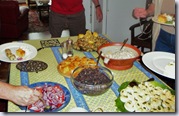 The Fourth of July parties were lots of fun: as hoped, it was a good opportunity to get together with other expats and have a familiar (parochial) celebration. We indulged traditional American pastimes of eating (hamburgers, chips, and beer), arguing about politics (Obama as socialist / Palin as genius, but I can hold my own amidst such barbarisms), and lying in the shade (my specialty since I arrived on crutches).
The Fourth of July parties were lots of fun: as hoped, it was a good opportunity to get together with other expats and have a familiar (parochial) celebration. We indulged traditional American pastimes of eating (hamburgers, chips, and beer), arguing about politics (Obama as socialist / Palin as genius, but I can hold my own amidst such barbarisms), and lying in the shade (my specialty since I arrived on crutches).
 Conversation was lively and engaging all evening. I’ve found that expatriates generally have T-shaped conversational ranges: superficially broad and narrowly deep in a pleasing way. Their wide travel experiences make them great raconteurs: full of good stories, specific advice, and self-depreciating experiences. At the same time, most have developed special interests in history or culture that run very deep, some write or lecture and are able to make arcane subjects fascinating.
Conversation was lively and engaging all evening. I’ve found that expatriates generally have T-shaped conversational ranges: superficially broad and narrowly deep in a pleasing way. Their wide travel experiences make them great raconteurs: full of good stories, specific advice, and self-depreciating experiences. At the same time, most have developed special interests in history or culture that run very deep, some write or lecture and are able to make arcane subjects fascinating.
Still, I was surprised at how out-of-touch many of them were with US political and cultural events. They haven’t ‘gone native’; they’ve simply disengaged, whether through personal disinterest or perceived irrelevance. I would think that this would create conversational gaps back home; maybe it’s what my US colleagues were referring to when they suggested that “people moving overseas get weird after they’ve been gone more a few years”.
———————————————————————
 I got sucked into the BBC series “On Thin Ice”, documenting a 700 km overland race to the South Pole. The series follows one team, James Cracknell and Ben Fogle, as they prepare for the endurance marathon, and their trials finding a third member and coming together as a functional unit in the months ahead of the race.
I got sucked into the BBC series “On Thin Ice”, documenting a 700 km overland race to the South Pole. The series follows one team, James Cracknell and Ben Fogle, as they prepare for the endurance marathon, and their trials finding a third member and coming together as a functional unit in the months ahead of the race.
I never liked watching people self-destruct in individual dramas like “Play Misty for Me”. But I really enjoy watching a good group train-wreck, where the individual personalities have to mesh to enable everyone to succeed.
The stories are as varied as the creative struggles documented in the Metallica movie, “Some Kind of Monster”, the team dynamics under stress in The Amazing Race, or the struggles to balance personal and team endurance in the Amundsen Omega 2 South Pole Race. None are competitive situations among team members. Rather, these are scenarios where everyone has to contribute and communicate, working together to achieve the common goal.
It’s probably the project leader in me, but these shows are great case studies.
———————————————————————
 The new business planning continues to make gratifying progress towards launch on August 1. I’m learning as I go; there are so many aspects to consider in getting a transnational business going. Legal, banking, and tax issues are still front and center, with parallel activity in the Netherlands and the US to make sure that everything goes smoothly and mates well.
The new business planning continues to make gratifying progress towards launch on August 1. I’m learning as I go; there are so many aspects to consider in getting a transnational business going. Legal, banking, and tax issues are still front and center, with parallel activity in the Netherlands and the US to make sure that everything goes smoothly and mates well.
The legal issues seem to be the simplest: everything is ready for the new residency / work application in the Netherlands, and I’ve got cross-border contract templates put together. The notary has moved rapidly through the incorporation procedures, and I should be a full BV next week.
The tax issues are trickier but workable if good advice is available. Finsens is doing a great job with all of the Dutch reporting, a local student is helping with bookkeeping, bills, and invoicing, and we are almost ready for our first quarterly report. Clark Nuber is handling the US side, they have strong overseas expertise and have spotted good opportunities for savings. Together, it’s going to run about $5000 per year, but the net tax savings and avoiding compliance penalties makes this a bargain.
The banking issues continue to be a pain. ING finally established my business account yesterday, over five weeks from the start. I just can’t explain why this was handled so badly: I hope it’s not an omen. HSBC will be the US banking portal for the Dutch business: they can act interface with US clients and handle international transfers smoothly: I wish that they had branches in the Netherlands.
My former corporate parent continues to quickly and dispassionately sever my expatriate services. Most of the changes were expected, and I have replacements ready; the transition should be complete for both of us by the end of this month.
However, three major headaches have surfaced.
One is negotiating health insurance / COBRA benefits: it costs a lot to keep my current insurance, but there aren’t any good alternatives to replace it. That insurance isn’t accepted in the Netherlands, so I’m going to have to buy Dutch insurance, creating duplicate coverage. I’m still testing alternatives.
Another is tax withholding. Deloitte was responsible for tax equalization and reporting while I was an expat, but won’t advise beyond my separation. Since I don’t know the amount that they’ve reported to the US and Dutch governments, I can’t determine how much to withhold and pay to whom from any future income that I might get this year. Catching the lump-sum severance payment in a tax-advantaged way is also proving difficult, with several schemes on the table to consider.
Finally, I was given a non-negotiable two months to pack up and move back or my repatriation benefit would be withdrawn. In effect, I’ll be stranded here with future responsibility for my own goods and shipping. It may prove cheaper to store or discard my archetypic 13-boxes-of-stuff; it does challenge the “we’re sendng you over; we’ll bring you back” assurances that the assignment started with.
